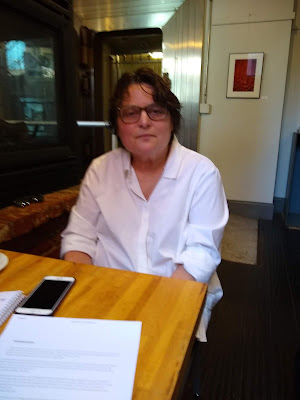 |
| Harte Weiner at the Bloc 11 Cafe in Somerville |
Editor Harte Weiner: She and her band
of editors will make you cut yourself while shaving
Article by Doug Holder
The renowned poet W. H. Auden said (and
I paraphrase), “a good poem makes me cut myself while shaving.”
And I guess the same principle applies to good editing. It cuts the
fat off the bone of the manuscript, leaving it clean and making the
readers hungry for more, more, more.
One morning, at my usual grazing
grounds in the Bloc 11 Cafe in Somerville, I met Harte Weiner,
founder of CambridgeEditors. We huddled around the fireplace
and Weiner told me about the history of the said organization, she
recalled “In 2003 I started CambridgeEditors. We have grown
to about 35 editors and expanded from what remains our focus,
creative writing, humanities and social sciences—to editing in
other fields and professions. We are a little and literary company
run out of my home in Cambridge, MA.”
Weiner, who is a member of
Cambridgeport’s Temple Eitz Chayim where she met the poet
Harris Gardner, loves the community there, and its encircling
lyric-historic neighborhood. She has a very interesting literary
background. Weiner told me in the 1980s she was an intern for the
formidable literary magazine The Paris Review. Reviewing
manuscripts for possible publication, she and others could work in
the Upper East Side apartment of George Plumpton, the
Review’s founder, just above the brick walled enclave of the
office itself. Three responses slips were provided for return with
their SASE’s. On the Review’s famous letter head
stationery of iconoclastic American Eagle with pen wearing a French
Revolutionary’s helmet of liberty, exciting new submissions
received either, ‘Thank you, we’d like to see more;’ or the
offer to publish.” Weiner remembers her elation at coming across
real talent that she would pass along to Jonathan Galassi, the
Review’s Poetry Editor at the time. Later Weiner would join
the Masthead for some years as Contributing Editor.
During this
period Weiner met such people as Tom Jenks of Narrative Magazine.
Jenks, a fellow work-study intern whose Columbia School of the Arts
degree took the fiction route. Pursuing a career in publishing, Jenks
played a key role in the edit of The Garden of Eden, a
Hemingway novel to emerge posthumously from Scriber’s.
Weiner also served as the Assistant
Director at The Academy of American Poets. There she worked
for a spell alongside the poet Henri Cole, also a Columbia School of
the Arts classmate. Meeting ‘more or less every famous poet she’d
ever wanted to meet,’ Weiner joined Henri in dining with these
poets after Donnell Library readings.
The editor has had extensive teaching
experience at Harvard University and Tufts University—right here in
Somerville. At Tufts Weiner said, “I taught for five years along
with David Rivard, Marie Howe, and a great poet we lost recently,
Lucie Brock Broido.”
Weiner's first love is poetry. She has
studied with likes of Derek Walcott, Seamus Heaney, Phillip Levine,
and Robert Pinsky—to name a few.
Earlier in her literary career she
published poetry in the Harvard Review, The Paris Review, and
was the recipient of the prestigious Grolier Prize in 1981. She hopes
to re-focus increasing each year on writing of her own, and is
pulling together a selection called, Haunted Timmy. “It’s
not what it sounds,” says Weiner, who first divulged the title
around Halloween time.
Weiner told me that she started
CambridgeEditors by posting flyers around Cambridge and was a habitué
of Gnomon Copy in Harvard Square. This is reminiscent of what Eve
Bridberg, the founder of the writer’s organization Grub Street,
did to jump start her fledgling enterprise. Weiner told me that her
group has grown over the years—to a much more wide-reaching
clientele.
I asked Weiner what it takes to be an
editor at CambridgeEditors. She replied, “Well, they have to go
through a series of tests. We seek people with advanced
degrees—mostly PhD’s. With our creative writing it is more by
invitation. Poet Charles Coe is one of our creative writing editors.”
The typical client according to Weiner
is from Cambridge and Somerville or just across the river that
separates the little and literary art scene from Boston’s
antiquarian one (although she has a fair number of international
clients), usually academics, graduate students, or writers who want
to have their manuscripts, articles, poetry, novels edited. And if
you view the CambridgeEditors website you will see a plethora of
testimony from folks her organization has helped over the years. Is
money a little tight? Weiner said she customizes her editing to fit
people of lesser means. And if she is really enamored with a
project—she might offer a discount as well.
And bye- the-way I had this prolific
editor edit this article-- and I am a better writer for it!



































